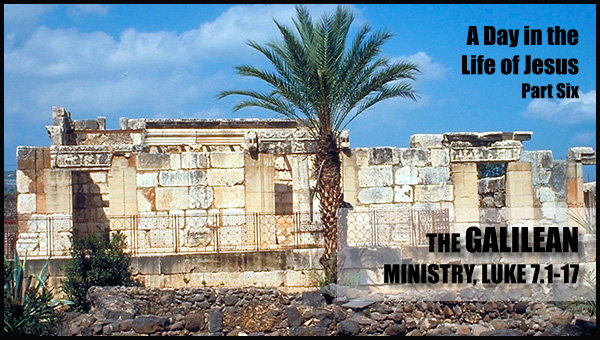By Tyson Thorne

The Galilean Ministry at Various Cities (4.14-9.50), 7.1-17 - A Day in the Life of Jesus, Part Six
His sermon over, Jesus left the plains and entered Capernaum, a city on the northwest shore of the Sea of Galilee and a major trade center for the region. This is still the same day that Jesus chose the disciples, which occurred after staying up all night in prayer over that decision. He had to be tired, even so there was work to do. Following his teaching he set about proving his message was from God by performing Messianic signs. Luke records these two miracles, a healing and raising someone from the dead, in greater detail than the other Gospel writers.
As Jesus enters the city he is approached by Jewish elders who have a special request. They have come on behalf of a Roman military man, the commander of 100 troops, known as a Centurion. This is nearly unheard of, as most Romans, especially members of the Roman guard, were hated by the Jewish population who wanted their independence from Rome. This one was different, however, as he demonstrated his respect for Judaism and his love for the people by building them a synagogue (possibly the one pictured above). This commander had a servant that had fallen ill, and they asked if Jesus would come and heal her. We know from Matthew the illness was painful and caused paralysis. Matthew also gives the appearance that the Roman approached Jesus himself omitting the role of the Jewish elders altogether. This is not a contradiction but rather an expediency for telling the story. Regardless, Jesus accepts the invitation and visits the Centurion’s home.
Upon his arrival the Roman greets Jesus with great humility. It is uncertain if the man had ever heard Jesus teach before, but he certainly understands the concept of authority as Jesus does and even believes that Jesus has authority over all things. I can’t personally imagine anything amazing the second member of the Trinity, but that is what Luke tells us – that Jesus was pleased and amazed at the man’s insights. He commends the man’s faith in front of everyone and while faith is an important concept Luke builds throughout the Galilee ministry, the focus here is on authority especially as it ties in to the big idea of this Gospel: Jesus is the savior and rightful king of all peoples everywhere.
It should be noted, as we have elsewhere on Think-Biblically.com, that Jesus never discourages military service or recommends the soldier leave his command.
After leaving Capernaum Jesus approaches a small town called Nain. As he nears the city gates a funeral procession exits the town. Luke tells us the young man who had dies was the only son of a widow who would now have no one to care for her. Luke rarely mentions Jesus’ emotions, but in these two instances he tells us about Jesus being pleased with the Centurion and now feeling compassion for the widow and her tragic circumstances. Luke tells the story quite dramatically. The procession stops, Jesus warmly tells the widow not to weep (one can imagine his reassuring hand on her frail shoulder), then moving to the stretcher the body was being carried on Jesus stretches forth his hand and, gripping the plank, tells the corpse to get up! No one moved, no one even dared to breath. Somewhere a hawk screeches (okay, I’m taking some license here, but hawks always screech at such intense moments in the movies). The young man sat up and began to speak! We’re not told what he said, perhaps it was the continuation of a conversation he was having as he died, or perhaps he was talking to someone in heaven before being sent back to the earthly plane. We don’t know. We do know that the bystanders began praising God!
Jesus demonstrated not only a range of emotions but authority over illness and death, miracles that were meant to prove Jesus is the Messiah sent by God to save humanity and usher in the Kingdom.
|
|